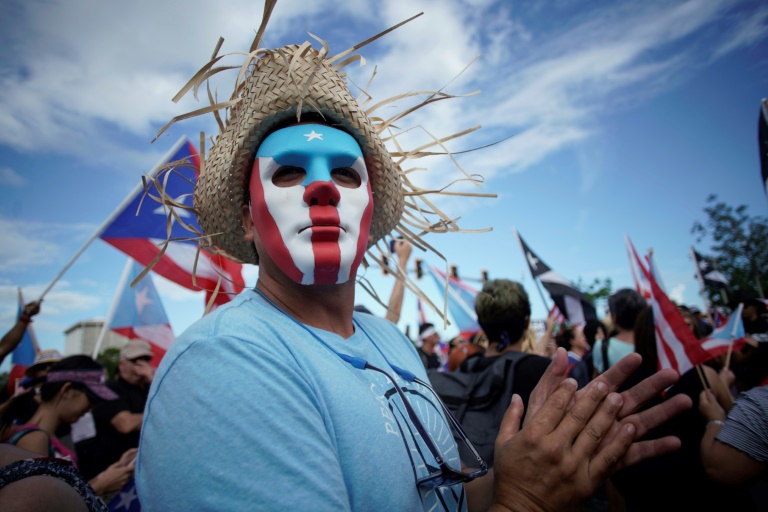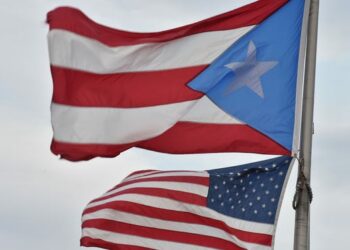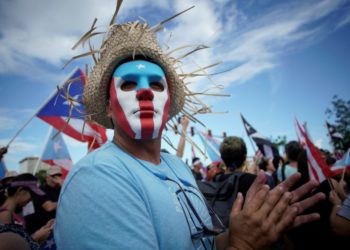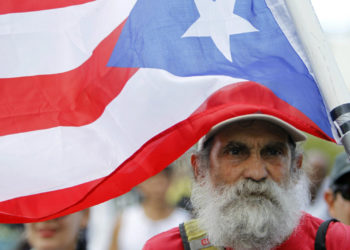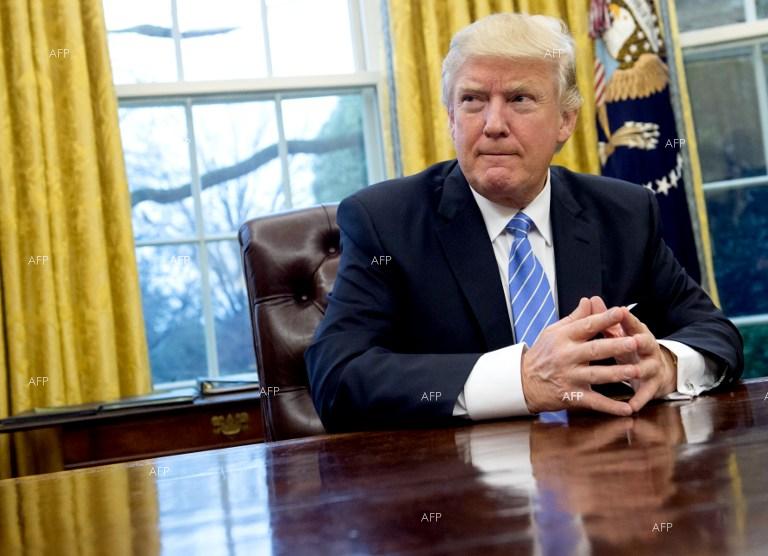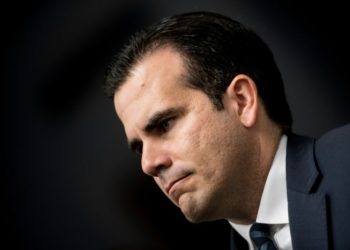Puerto Rico is undergoing its most dramatic political transformation since it became a U.S. territory in 1898-1899. Late Wednesday night, after two weeks of unprecedented popular mobilization and massive protests, Governor Ricardo Rosello reluctantly and unapologetically announced his resignation effective August 2.
During the first half of the 20th century, Puerto Rico experienced a gradual expansion of self-rule and civil rights that culminated in the 1952 formation of a democratic Commonwealth, neither independent nor a state of the Union but freely associated with the United States.
BREAKING: It is official. @ricardorossello will resign effective August 2. Protesters light fireworks, erupt in euphoric cheer. Here is the moment they find out their cries, fraught as they are, have been heard. That Ricky has resigned. #rickyrenuncia #PuertoRico pic.twitter.com/y3FYBidOGa
— Nick Brown (@NickPBrown) July 25, 2019
Under the leadership of progressive politician Luis Munoz Marin and his selfless think tank and followers, and with the support of the Franklin D. Roosevelt administrations and others that followed, Puerto Rico experienced miraculous economic and social development. Measuring only 3,515 square miles, the island became America’s “showcase of Democracy” and model for successful capitalist economic prosperity.
Tax Benefits and Recession
These extraordinary developments, however, were underpinned by structural dependency on the United States and special concessions by the insular government to U.S. corporations and investors. Among them stands out Section 936 of the U.S. Internal Revenue Service Code that freed corporations from tax payments as long as they reinvested their profits on the island.
Fast forward to 1996. For decades, leaders of the pro-Commonwealth Popular Democratic Party claimed that their status preference was the best guarantee for economic prosperity because it allowed the continuation of Section 936, a provision that states of the Union did not enjoy. In an effort to kill the 936 argument, Governor Pedro Rosello – Ricardo’s father – argued for the elimination of that provision and did not raise a finger to defend it. The result was a ten-year gradual face out that ended in 2005. Two years later, the economy entered a deep recession from which it has not yet recovered.
The crisis that exploded in the middle of the century’s first decade is complex and has had multiple reverberations that feed off of each other. Factories that enjoyed tax exemptions closed, thus eliminating some of the best paying jobs; mass emigration of Puerto Ricans to the United States (mainly to Central Florida) increased dramatically, ridding the island of hundreds of Puerto Ricans in productive ages; house prices plummeted, and the tax base shrank.
Attempts to Save Puerto Rico’s Economy
Beginning in 1973, Puerto Rico, its municipalities, and the state’s public corporations issued millions of dollars’ worth of bonds to balance their budgets. In 2014, many of those bonds were downgraded to “junk” status, and a few months later, the unpopular pro-Commonwealth Governor Alejandro Garcia Padilla declared that the 74 billion-dollar debt was unrepayable.
The United States government, in defense of U.S. bondholders, established the Puerto Rico Oversight Management and Economic Stability Act (PROMESA) Board and gave it broad powers that impinged on the island’s traditional fiscal and political autonomy, including final say on insular budgets.
Governor Ricardo Rosello, a promoter of statehood, has proven supine. He has imposed austerity measures with detrimental effects on the masses: higher taxes, public utility fee hikes, reduction of public services, and the systematic defunding of the state university system. More alarming yet, are plans to slash retiree pensions, eliminate federal minimum wage protections for younger workers, and sell off, wholesale, state properties.
Hurricane Maria and Corruption
In the wee hours of September 20, 2017, Hurricane Maria struck the island, causing unprecedented damage and the death of over 4,000 residents. The Rosello administration stubbornly maintained for months that the actual death toll was under 100. To add insult to injury, President Donald J. Trump visited the island and tossed rolls of paper towel at a gathering of Puerto Ricans. Since then, the Trump administration has withheld the bulk of fund transfers allotted for disaster relief and reconstruction.

In the meantime, members of the island’s governing party have engaged in horrendous acts of corruption that included not distributing food and water for hurricane victims because keeping those provisions in truck containers generated enormous profits to well-connected contractors. Two weeks ago, federal authorities arrested several high-ranking administration officials on corruption charges, including the former secretary of education.
Popular indignation with the insular government had already reached a feverish peak when the Center for Investigative Journalism released 900 pages of chats exchanged between the governor and several of his cabinet members and closest political associates. Long familiar with the government’s ineffectiveness, abuse of power, and corruption, the people of Puerto Rico read the atrocious chat statements that included misogynistic, homophobic, and other insulting comments.
Chat group members bragged about their own corrupt acts, applauded the fact that they had successfully pushed thousands of Puerto Ricans out of the island, denigrated political opponents, and worse yet, made sick jokes about those killed by the hurricane. The publication of those infamous chats was the crisis’ let-them-eat-cake moment. The masses mobilized like never before and charged against the island’s tropical bastille.
Social and Political Earthquake
The ongoing protests are the “Big One:” a social and political earthquake resulting from decades of mounting tectonic pressure along the manifold fissures that divide society: rich versus poor, men versus women, light-skinned versus darker-hued, the old versus the young, and those in favor and against gay rights.
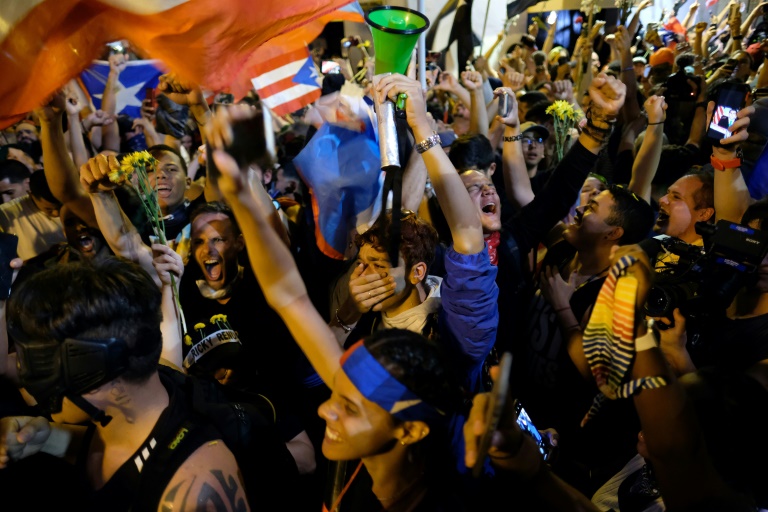
The island will continue to shake after Rosello steps down. We can expect thunderous aftershocks for months and years: pressures to clean up all government institutions, fights against the indignities perpetrated by PROMESA, the auditing of the public debt, and the abolition, for once and for all, of the fraud of the island’s status-preference-based party system. The Commonwealth is a cadaver: statehood is not an option – now less than ever – and independence will continue to be a unicorn aspiration.
This 100 x 35-miles island, in a peaceful way, has lectured the world on the meaning of true democracy.
Disclaimer: The views and opinions expressed here are those of the author and do not necessarily reflect the editorial position of The Globe Post.

